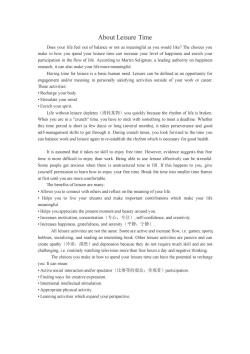《新编大学英语》综合教程(第三版第四册)B4U1_self-market_self-reading_About leisure time

About Leisure Time Does your life feel out of balance or not as meaningful as you would like?The choices you make in how you spend your leisure time can increase your level of happiness and enrich your participation in the flow of life.According to Martin Seligman,a leading authority on happiness research,it can also make your life more meaningful. Having time for leisure is a basic human need.Leisure can be defined as an opportunity for engagement and/or meaning in personally satisfying activities outside of your work or career. These activities: ·Recharge your body.. ·Stimulate your mind.. ·Enrich your spirit. Life without leisure depletes(消耗某物)you quickly because the rhythm of life is broken. When you are in a"crunch"time,you have to stick with something to meet a deadline.Whether this time period is short(a few days)or long (several months),it takes perseverance and good self-management skills to get through it.During crunch times,you look forward to the time you can balance work and leisure again to re-establish the rhythm which is necessary for good health. It is assumed that it takes no skill to enjoy free time.However,evidence suggests that free time is more difficult to enjoy than work.Being able to use leisure effectively can be stressful. Some people get anxious when there is unstructured time to fill.If this happens to you,give yourself permission to learn how to enjoy your free time.Break the time into smaller time frames at first until you are more comfortable. The benefits of leisure are many: Allows you to connect with others and reflect on the meaning of your life. Helps you to live your dreams and make important contributions which make your life meaningful. Helps you appreciate the present moment and beauty around you. ·Increases motivation,concentration(专心,专注),self-confidence,.and creativity. ·Increases happiness,.gratefulness,and serenity(平静,宁静). All leisure activities are not the same.Some are active and increase flow,ie.games,sports hobbies,socializing,and reading an interesting book.Other leisure activities are passive and can create apathy(冷淡,漠然)and depression because they do not require much skill and are not challenging,i.e.routinely watching television more than four hours a day and negative thinking. The choices you make in how to spend your leisure time can have the potential to recharge you.It can mean: ·Active social interaction and/or spectator(比赛等的观众:旁观者)participation. Finding ways for creative expression. .Intentional intellectual stimulation. Appropriate physical activity. Learning activities which expand your perspective
About Leisure Time Does your life feel out of balance or not as meaningful as you would like? The choices you make in how you spend your leisure time can increase your level of happiness and enrich your participation in the flow of life. According to Martin Seligman, a leading authority on happiness research, it can also make your life more meaningful. Having time for leisure is a basic human need. Leisure can be defined as an opportunity for engagement and/or meaning in personally satisfying activities outside of your work or career. These activities: • Recharge your body. • Stimulate your mind. • Enrich your spirit. Life without leisure depletes(消耗某物)you quickly because the rhythm of life is broken. When you are in a "crunch" time, you have to stick with something to meet a deadline. Whether this time period is short (a few days) or long (several months), it takes perseverance and good self-management skills to get through it. During crunch times, you look forward to the time you can balance work and leisure again to re-establish the rhythm which is necessary for good health. It is assumed that it takes no skill to enjoy free time. However, evidence suggests that free time is more difficult to enjoy than work. Being able to use leisure effectively can be stressful. Some people get anxious when there is unstructured time to fill. If this happens to you, give yourself permission to learn how to enjoy your free time. Break the time into smaller time frames at first until you are more comfortable. The benefits of leisure are many: • Allows you to connect with others and reflect on the meaning of your life. • Helps you to live your dreams and make important contributions which make your life meaningful. • Helps you appreciate the present moment and beauty around you. • Increases motivation, concentration(专心,专注), self-confidence, and creativity. • Increases happiness, gratefulness, and serenity(平静,宁静). All leisure activities are not the same. Some are active and increase flow, i.e. games, sports, hobbies, socializing, and reading an interesting book. Other leisure activities are passive and can create apathy(冷淡,漠然)and depression because they do not require much skill and are not challenging, i.e. routinely watching television more than four hours a day and negative thinking. The choices you make in how to spend your leisure time can have the potential to recharge you. It can mean: • Active social interaction and/or spectator(比赛等的观众;旁观者)participation. • Finding ways for creative expression. • Intentional intellectual stimulation. • Appropriate physical activity. • Learning activities which expand your perspective
按次数下载不扣除下载券;
注册用户24小时内重复下载只扣除一次;
顺序:VIP每日次数-->可用次数-->下载券;
- 《新编大学英语》综合教程(第三版第四册)B4U1_self-market_self-listening_phelps.doc
- 《新编大学英语》综合教程(第三版第四册)B4U1_self-market_For teachers.doc
- 《新编大学英语》综合教程(第三版第四册)B4U1_self-market_background information.doc
- 《新编大学英语》综合教程(第三版第四册)B4U1 Translation & Writing.ppt
- 《新编大学英语》综合教程(第三版第四册)B4U1 Read by critical thinking.ppt
- 《新编大学英语》综合教程(第三版第四册)B4U1 QUIZ_oral quiz.ppt
- 《新编大学英语》综合教程(第三版第四册)B4U1 QUIZ_06 B4U01 QUIZ.doc
- 《新编大学英语》综合教程(第三版第四册)B4U1 Menu.ppt
- 《新编大学英语》综合教程(第三版第四册)B4U1 Activate.ppt
- 《新编大学英语》综合教程(第三版第三册)B3U4_Self-market_Reading Material_B3U4课文翻译及课后练习答案.doc
- 《新编大学英语》综合教程(第三版第三册)B3U4_Self-market_Reading Material_B3U4 课文背景材料.docx
- 《新编大学英语》综合教程(第三版第三册)B3U3_Self-market_Reading Material_B3U3课文翻译及课后练习答案.doc
- 《新编大学英语》综合教程(第三版第三册)B3U3_Self-market_Reading Material_B3U3 课文背景材料.docx
- 《新编大学英语》综合教程(第三版第三册)B3U1_Self-market_Reading Material_B3U1课文翻译及课后练习答案.doc
- 《新编大学英语》综合教程(第三版第三册)B3U1_Self-market_Reading Material_B3U1 课文背景材料.docx
- 《新编大学英语》综合教程(第三版第三册)B3U4_Self-market_B3U4 QUIZ_Unit 4 Quiz.doc
- 《新编大学英语》综合教程(第三版第三册)B3U4_Self-market_B3U4 QUIZ_B3U4 Oral Quiz.ppt
- 《新编大学英语》综合教程(第三版第三册)B3U4_Self-market_B3U4 Grammar and Vocabulary.doc
- 《新编大学英语》综合教程(第三版第三册)B3U3_Self-market_B3U3 Grammar and Vocabulary.doc
- 《新编大学英语》综合教程(第三版第三册)B3U1_Self-market_B3U1 Grammar and Vocabulary.doc
- 《新编大学英语》综合教程(第三版第四册)B4U1_self-market_self-reading_How Christie Wrote.doc
- 《新编大学英语》综合教程(第三版第四册)B4U1_self-market_self-writing_如何表达总论点1.doc
- 《新编大学英语》综合教程(第三版第四册)B4U1_self-market_vocabular and grammar.doc
- 《新编大学英语》综合教程(第三版第四册)B4U2 Activate.ppt
- 《新编大学英语》综合教程(第三版第四册)B4U2 Menu.ppt
- 《新编大学英语》综合教程(第三版第四册)B4U2 QUIZ_06B4U02 QUIZ.doc
- 《新编大学英语》综合教程(第三版第四册)B4U2 QUIZ_oral quiz.ppt
- 《新编大学英语》综合教程(第三版第四册)B4U2 Read by critical thinking.ppt
- 《新编大学英语》综合教程(第三版第四册)B4U2 Translation & Writing.ppt
- 《新编大学英语》综合教程(第三版第四册)B4U2_self-market_background information.doc
- 《新编大学英语》综合教程(第三版第四册)B4U2_self-market_self-reading_Effective Communication.doc
- 《新编大学英语》综合教程(第三版第四册)B4U2_self-market_self-reading_The Power of Words-different authors.doc
- 《新编大学英语》综合教程(第三版第四册)B4U2_self-market_self-reading_The power of words-Parenting.doc
- 《新编大学英语》综合教程(第三版第四册)B4U2_self-market_self-writing_如何表达总论点2.doc
- 《新编大学英语》综合教程(第三版第四册)B4U2_self-market_vocabulary and grammar.doc
- 《新编大学英语》综合教程(第三版第四册)B4U2_Teacher 1, Bk 4 [Final to fltrp].doc
- 《新编大学英语》综合教程(第三版第四册)B4U4 Activate.ppt
- 《新编大学英语》综合教程(第三版第四册)B4U4 Menu.ppt
- 《新编大学英语》综合教程(第三版第四册)B4U4 QUIZ_oral quiz.ppt
- 《新编大学英语》综合教程(第三版第四册)B4U4 QUIZ_Unit Four QUIZ.doc
